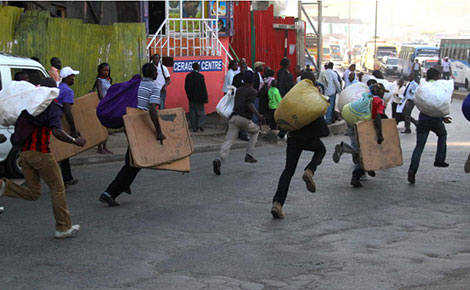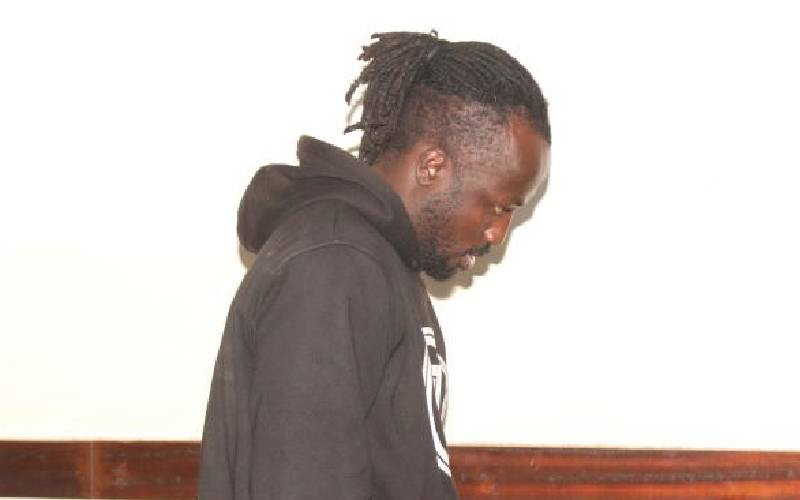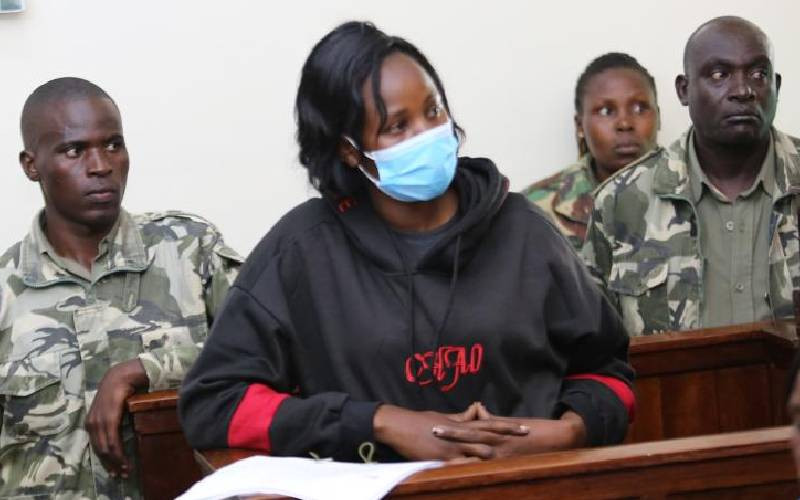 |
|
Hawkers in running battles with County officers. County askaris are in a spot for terrorising hawkers. [PHOTO: MBUGUA KIBERA/STANDARD] |
The conduct of Nairobi City County askaris has been put into sharp question after the hacking to death of a hawkers’ leader. Indeed, many are asking whether he was killed to cover up other senseless killings of hawkers.
Four city inspectorate department askaris have been directly implicated for the death of Mr Irungu Kamau, who was hacked to death in a city hotel last year. Apparently, the same officers have been widely mentioned by victims as part of a team that has been using machetes, knives, iron bars, rungus, broken bottle glasses and stones to brutalise street vendors since last year.
The said chain of events dates back to May 26, 2012, when Mr Peter Muhoro was shot dead along River Road in Nairobi. He was among street vendors fleeing from county askaris. The killer bullet was reportedly fired by a police officer attached to Central Police Station who had accompanied the county officers.
Mr Muhoro was shot in the chest and an autopsy report by Government pathologist Dr Oduor Johansen showed that he died as a result of a gunshot from a low velocity firearm fired at close range.
Early last year, the office of the Director of Public Prosecutions directed the Criminal Investigations Department (CID) to act on the case, and followed the same with multiple reminders.
The Independent Medico-Legal Unit (IMLU) on its part sought to institute legal proceedings against both the Police Service and the county government. Having witnessed the incident, Mr Kamau, then deputy chairman of the city hawkers’ association, volunteered to testify in the case alongside the association’s chairman, Mr Steve Waweru. Along the way, things took a surprising turn on September 16 last year.
Kamau and his friends were on their way to a funeral committee meeting of a fellow small-scale trader when they were accosted by city council askaris well-known to them at Nyamakima in downtown Nairobi.
A colleague, who seeks anonymity for security reasons recounts the fateful day: “They chased us and I managed to dodge them at the Simba Coach bus terminus. Kamau could not run fast enough and on realising they would catch up with him, he took refuge at Nyam Hotel.”
He says the officers chased the deceased into the hotel, tried to drag him out and then gruesomely attacked him when he firmly held onto a metal bar by the door and refused to come out.
“One of the officers proceeded to cut Irungu’s hand with a panga, two others stabbed him on the head and body using knives while another struck him on the head with bottles he carried in a black paper bag,” he narrates.
The officers, he says, walked away moments later, leaving the vendor for dead. He was rushed to Guru Nanak Hospital, and later to Kiambu District Hospital, where he died 12 hours later.
A postmortem shows he died due to extensive muscoskeletal injuries due to blunt force trauma consistent with assault. “The circumstances seem known to the police and eyewitnesses. This needs follow-up to ascertain the facts about the death and to mete out justice to the victim,” the pathologist, Dr Peter Ndegwa, commented in the report.
Last April, IMLU Executive Director Peter Kiama, wrote to Nairobi Governor Evans Kidero and identified the involved inspectorate department officers as Alfred Marenya alias Brown, Ambani Akasi alias Wasi Wasi, Protus Sarara and Julius Ochieng’ among others. He called for their interdiction and investigations into their conduct.
In the letter copied to Inspector General of Police David Kimaiyo, Director of Public Prosecutions Keriako Tobiko, the Kenya National Commission on Human Rights, the Speaker of Nairobi County Assembly and the OCPD Central Police Station, he called for a probe of the entire county inspectorate department regarding use of force against small-scale traders.
Despite the receipt of the letter being officially acknowledged by his office on April 17, 2014, and a subsequent reminder sent and received by the same office mid last month, Dr Kidero told The Standard on Saturday that he is yet to personally receive it. A copy of the letter was, however, received and discussed in the County Assembly.
Stay informed. Subscribe to our newsletter
In the letter, Kiama said the many recorded cases of torture, inhumane treatment and unlawful killing of hawkers constituted gross acts of human rights violation under the Constitution and other international statutes that Kenya has ratified.
“The law and/or the by-laws are clear as to the process which if a person is hawking without licence should be subjected to. It does not give the law enforcement agencies the power to employ unreasonable, illegal, and unnecessary torture, inhuman, degrading treatment or punishment,” he said. Kiama stated that further use of firearms by police officers accompanying the askaris is unwarranted and a contravention of the National Police Service Act.
Coincidentally, Waweru, a vocal hawkers’ chairman, would last year meet his death in mysterious circumstances. He was stabbed to death in the city by two drunken youth apparently known to him.
“The two just appeared and started assaulting Waweru’s wife. When he was notified and went to inquire what was happening, one stabbed him with a knife in the chest. They are yet to be arrested and we suspect he was also eliminated to clear evidence on Muhoro’s case,” says a vendor.
Last week, Nairobi Senator Mike Sonko also wrote to the CID director calling for swift investigations into the killing of hawkers in Nairobi by city county askaris. He particularly called into investigations into the death of Kamau, Harun Gathece, who was stabled to death by county askaris at the New Ngara Market on October 8, this year and that of Omondi Okoth, shot by askaris in city county vehicles on July 3, 2014. He named Wasi Wasi as the main perpetrator.
“It is sad that in the last one year, eight street hawkers have been killed by city askaris through forceful use of live bullets, machetes, knives, broken bottles and other crude weapons... I trust your office will ensure justice prevails,” he said in the letter copied to Interior Cabinet Secretary Joseph ole Lenku.
 The Standard Group Plc is a
multi-media organization with investments in media platforms spanning newspaper
print operations, television, radio broadcasting, digital and online services. The
Standard Group is recognized as a leading multi-media house in Kenya with a key
influence in matters of national and international interest.
The Standard Group Plc is a
multi-media organization with investments in media platforms spanning newspaper
print operations, television, radio broadcasting, digital and online services. The
Standard Group is recognized as a leading multi-media house in Kenya with a key
influence in matters of national and international interest.
 The Standard Group Plc is a
multi-media organization with investments in media platforms spanning newspaper
print operations, television, radio broadcasting, digital and online services. The
Standard Group is recognized as a leading multi-media house in Kenya with a key
influence in matters of national and international interest.
The Standard Group Plc is a
multi-media organization with investments in media platforms spanning newspaper
print operations, television, radio broadcasting, digital and online services. The
Standard Group is recognized as a leading multi-media house in Kenya with a key
influence in matters of national and international interest.









